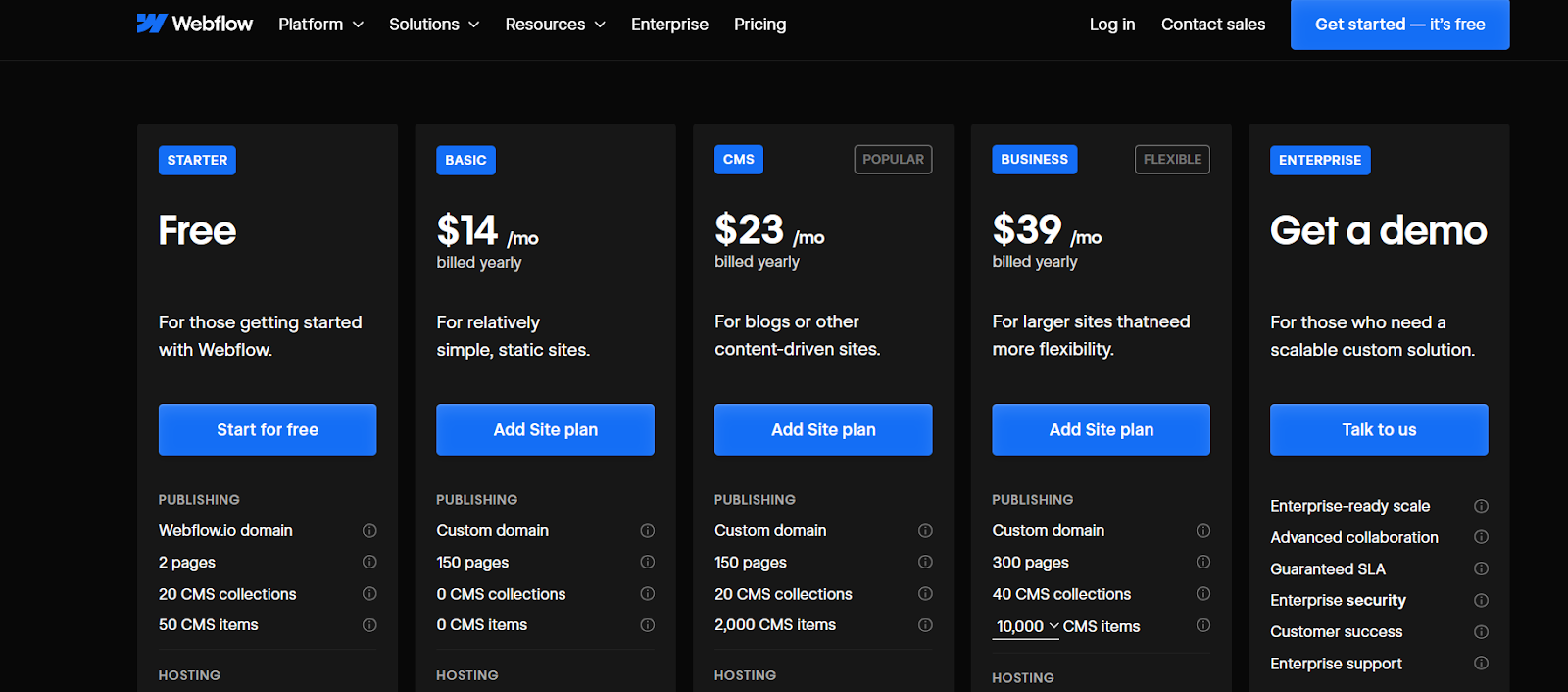.png)
A prospective client asked:
“How to make a booking website, where people can get appointments online without facing the hassle of calling reception, it should not be generic but more about telling our brand story through visuals”…and that’s how the sales call started.
Instead of saying “We can help you develop and deploy a booking website
”We took a different route, helping the lead understand the steps and ways they can create a booking website.
So, we recently created a job post for a developer to help create my website. The expectation was north of $130k/year, and that doesn’t include benefits such as health insurance and subscription to wellness programs.
The calculations were going all crazy in my head…so I decided to ditch that idea and go towards a Content Management System (CMS) platform. I talked to a few friends and the opinion was divided; one side favored WordPress and the other went with Webflow.
Which one should I choose?
.png)
When we created a Webflow account, there was a short survey in the beginning. I answered that with little to no knowledge of HTML/CSS. And to my surprise, the tutorial that I was shown next was catered to my understanding of the platform.
This indicates that I don’t need to be a pro-coder to create a website on Webflow. There’s also an AI Learning Assistant and Webflow University documentation to help me get comfortable with the platform.
.png)
On the other hand, WordPress is a bit back and forth. Here’s how not-so-user-friendly WordPress is:
Rating
Verdict: Webflow Wins
.png)
Webflow offers a pretty vast level of customization, especially for a non-developer like myself. I always wanted a visually appealing website with little to no restrictions on customizations.
On the other hand, WordPress is a CMS platform where I would need to hire a developer if I want any sort of customization (such as adding dynamic pages).
.png)
Choice of Templates?
I did notice that WordPress has over 13,000 templates, but these would only help create a static website (which basically has no interactive pages).
.png)
Webflow falls behind in this one, with only 6000 templates. This is because there are fewer contribution options from the community. But that’s okay given just how much newer it is than WordPress.
The more the merrier, isn’t always true.
Verdict: Webflow Wins
I have an in-house marketing team. And I gave them access to both Webflow and WordPress and was interested in what they had to say.
Marcus (Content Lead): I used both Webflow and WordPress for a week. For the former, every time I wanted to add a writer to edit the content, I was prompted to pay for the limited seat, which was $15/user/month.
Whereas for WordPress, the edit access was limited. If I was making changes, then no other person could simultaneously edit the doc. Webflow wins (if you have a small writers’ team).
Ann (SEO Manager): Webflow generates sitemaps which makes it easier for me to index the website. WordPress can be optimized through plugins such as Rank Math and Yoast SEO.
On WordPress, everything comes down to the plugins you use, this is not the case for Webflow. But without plugins, WordPress isn’t of much use. Webflow Wins.
P.S. I downloaded apps from the marketplace that would help me write SEO-optimized content.
.png)
Here’s an average rating from both Marcus and Ann:
Verdict: Webflow Wins
One of the most important aspects that I considered when ranking both WordPress and Webflow was security.
Like if my site goes live, how likely is it that it’ll be hacked or abused by the competition?
Here are some questions I had and how each fared against different security factors.
Ranking:
Verdict: Webflow Wins
.png)
I work with clients from different niches, and e-commerce clients make up 20% of my total customer base.
So when they are in the onboarding stage, I need to figure out which platform works for them and us. The purpose is to give them optimization while also improving productivity.
I compared both Webflow vs WordPress, keeping in mind the requirements of an ecommerce store.
.png)
This is what the backend of an ecommerce store looks like on WordPress
Ranking:
Verdict: WordPress Wins
In this Webflow vs WordPress, I downloaded a free template of the latter and started working on my website.
But to make the website functional (like posting blogs and making sure it’s SEO-optimized) I purchased $2.99/month, keeping costs at a minimum. And for WooCommerce, it was $4.99/month.
For Webflow, I purchased the $14/month plan. This way I was able to connect it to my website’s domain which help in brand awareness and makes it professional. For the e-commerce store, I purchased the $29/month plan.

Rating
Verdict: WordPress Wins
In this Webflow vs WordPress, I found that Webflow was a better platform as compared to WordPress. Here’s the total score of each platform:
So if you are a business such as mine, focused on growth with a few e-commerce clients, I would recommend opting for Webflow.
Yes, Webflow is better than WordPress. The former is a no-code solution that has a user-friendly interface. Whereas, WordPress has a steep learning curve and is completely reliant upon third-party plugins which is not a secure option.
If you want your website to have a creative outlook then consider switching to Webflow. You can customize your website, as you please without any kind of roadblocks.
Yes, Webflow is considered a good alternative to WordPress. Think of it as a canvas where you can paint anything and everything you want when you are designing a website.